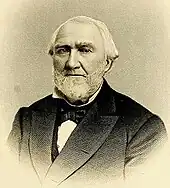
Bartholomew Figures Moore (1801–1878) was an American attorney and politician. As a Whig, he served in the North Carolina legislature then as Attorney General of the state from 1848 to 1851. He also was head of the North Carolina Bar for several years, becoming known as "father of the bar". A Unionist, he staunchly and vocally opposed succession and the Confederacy.
Early life and education
Moore was born January 29, 1801, in Halifax, North Carolina, to James Moore, who served as a sailor in the Revolutionary War, and Sally Lowe. He graduated from the University of North Carolina at Chapel Hill in 1820 and was admitted to the bar in 1823.[1]
Career
Moore began practicing law in Nashville, North Carolina. Initially unsuccessful, he gained a reputation as a skilled attorney in the 1834 North Carolina v. Negro Will (State v. Will) case invoking slave's rights which gained national interest. The case center around Will, a slave who was convicted of murdering his overseer. Following an altercation with another slave over a hoe, Will broke the hoe then left to resume work elsewhere. After learning of the incident, the overseer pursued Will on horseback but Will ran so the overseer shot him in the back. Eventually the overseer caught him and in the struggle the overseer was injured causing his death. Will was convicted of murder and sentenced to be hung as the lower court held a slave had no right to self-defense against a master. Representing the Will's owner on appeal, Moore successfully argued before the North Carolina Supreme Court a slave had the right the defend himself from his overseer if under threat of life, thus not murder.[2] In the decision written by Justice William Gaston, the court agreed and ordered a new trial. In a 1939 retrospective, The News and Observer called Moore's brief and oral arguments "a masterpiece of law and logic". [3][4]
In 1835 Moore returned to Halifax opening a practice there.[1] A Whig, Moore was elected to the House of Commons in 1836 representing Halifax but was defeated in 1838. Has was re-elected in 1840 serving three terms until 1846. In 1848, he moved to Raleigh and became head of the North Carolina Bar, succeeding then United States senator George E. Badger.[5] In that same year, Moore was appointed Attorney General by then Governor William Graham to replace Edward Stanly who had resigned. Moore left the office in 1851 to join the commission to revise North Carolina's statutes along with Asa Biggs and Romulus M. Saunders, codifying the Revised Code of North Carolina enacted by the General Assembly in 1854.[3][6]
Moore continued his practice in Raleigh as the Civil War loomed. A Unionist,[7][8] he staunchly and vocally opposed succession believing it was unconstitutional and detested the proposition of going to war, pleading to the public in letters to the press to keep the Union intact.[9][4][6] After North Carolina joined the Confederate and war was a reality, Moore refused to accept Confederate money.[10] When a judge required attorneys coming before the newly formed Federal court to plead oath to the Confederate States, Moore gathered his belongings and walked out.[4][6]
In 1865 after the end of the war, President Andrew Johnson invited Moore, former governor David Swain and former attorney general William Eaton to Washington to consult about North Carolina and Reconstruction efforts. Moore was also elected to the North Carolina Constitutional Convention, called by Governor William Holden, representing Wake County.[6]
In the decade after the war, Moore's practice mostly focused on Federal cases with his son-in-law joining the practice in 1871.[4]
Personal life
Moore married Louisa Boddie in 1828 who died in 1829. In 1835 he married Louisa's sister Lucy Williams Boddie with whom he had eleven children. Moore died November 27, 1878, following a long illness and buried at Oakwood Cemetery in Raleigh.[4][11]
In his will he wrote:
"No man suffered greater misery than I did as the scenes of battle unfolded the bloody carnage in the midst of our homes. I had been taught there could be no reliable liberty of my State without the Union of the States and being devoted to my State I felt that I should desert her whenever I should aid to destroy the Union."[3]
References
- 1 2 Allen, William Cicero (1918). History of Halifax County. Cornhill Company. pp. 188–190.
- ↑ Taylor, R. H. (1925). "Humanizing the Slave Code of North Carolina". The North Carolina Historical Review. 2 (3): 327–328. ISSN 0029-2494.
- 1 2 3 "Bartholomew F. Moore". The News and Observer. 1939-10-22. p. 35. Retrieved 2023-11-11.
- 1 2 3 4 5 "Moore, Bartholomew Figures | NCpedia". www.ncpedia.org. Retrieved 2023-11-11.
- ↑ Moore, John Wheeler (1880). History of North Carolina with Special Reference to the Annals of Hertford County and the Albemarle Country. p. 38.
- 1 2 3 4 Ashe, Samuel A'Court (1906). Biographical History of North Carolina from Colonial Times to the Present. C. L. Van Noppen. pp. 277–286.
- ↑ Yates, Richard E. (1941). "Governor Vance and the End of the War in North Carolina". The North Carolina Historical Review. 18 (4): 327. ISSN 0029-2494.
- ↑ Zipf, Karin Lorene (2005-05-01). Labor of Innocents: Forced Apprenticeship in North Carolina, 1715--1919. LSU Press. p. 59. ISBN 978-0-8071-3045-2.
- ↑ "Letters From The Hons. B. F. Moore and John H. Bryan". The Raleigh Register. 1860-10-20. p. 2. Retrieved 2023-11-12.
- ↑ "To 'A Correspondent.'". The Daily Progress. 1863-05-01. p. 2. Retrieved 2023-11-12.
- ↑ "OBITUARY.; JEAN FRANCOIS GUSTAVE ANDRE. M. DE VALDROME. BARTHOLOMEW F. MOORE". The New York Times. 1878-11-28. ISSN 0362-4331. Retrieved 2023-11-13.